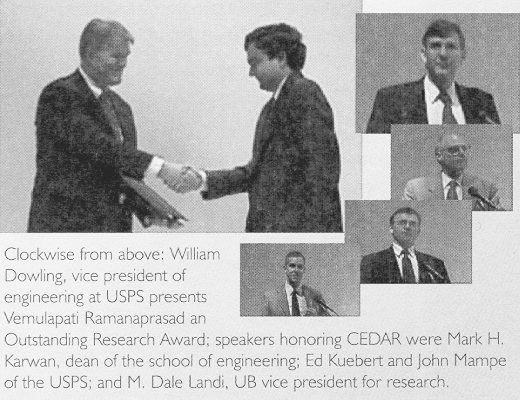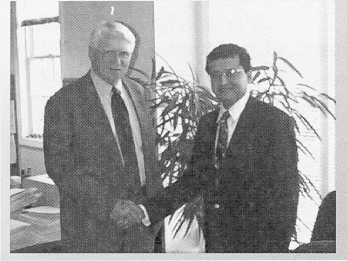
Buffalo, NY
Fall 1998
Page 5

Buffalo, NY
Fall 1998
Page 5
The Center of Excellence for Document Analysis and Recognition (CEDAR) celebrates its 15th anniversary of U.S. Postal Service (USPS) research funding, taking note of the partnership's successes and envisioning the future. The Center began with research into pattern recognition and artificial intelligence 20 years ago and has since evolved a science of recognition, analysis and interpretation of documents. Some of CEDAR's technological successes include the Handwritten Address Interpretation (HWAI) system, an automated process which locates, reads and interprets handwritten addresses, now fully deployed at all USPS processing centers; a HWAI system for Australia; Cherry Blossom, an OCR reading for Japanese a Reply Card Processing system for electrically delivering reply cards; and an electronic reader for the Internal Revenue Service.

At the anniversary celebration, CEDAR welcomed William Dowling, vice president of engineering at USPS. The USPS credits its partnership with CEDAR for markedly improving the technology of document recognition. The systems may cut labor costs by as much as $150 million per year by reducing the need for human routing of hand-addressed letters.
Dr. Sargur N. Srihari, director of CEDAR and SUNY distinguished professor of computer science and Engineering, notes that the USPS had a billion-dollar budget surplus in 1997. "We like to think that about one-tenth of that billion-dollar surplus was our contribution," Srihari says. He continues, "Our work spans the spectrum of computational theories, algorithms, software and hardware implementations." Research has expanded into document retrieval based on integrating document content such as text, photographs, speech and graphics; on-line/off-line handwriting recognition using linguistic information; reading fax documents, forms and checks; and reading printed documents with complex layouts.

Dr. Srihari asserts, "Automating the interpretation of documents is of scientific and economic importance. We are discovering computational structures for perception, language and their synthesis, and we are automating labor-intensive tasks involving paper."
CEDAR will organize the Fifth International Conference on Document Analysis and Recognition in India in 1999.